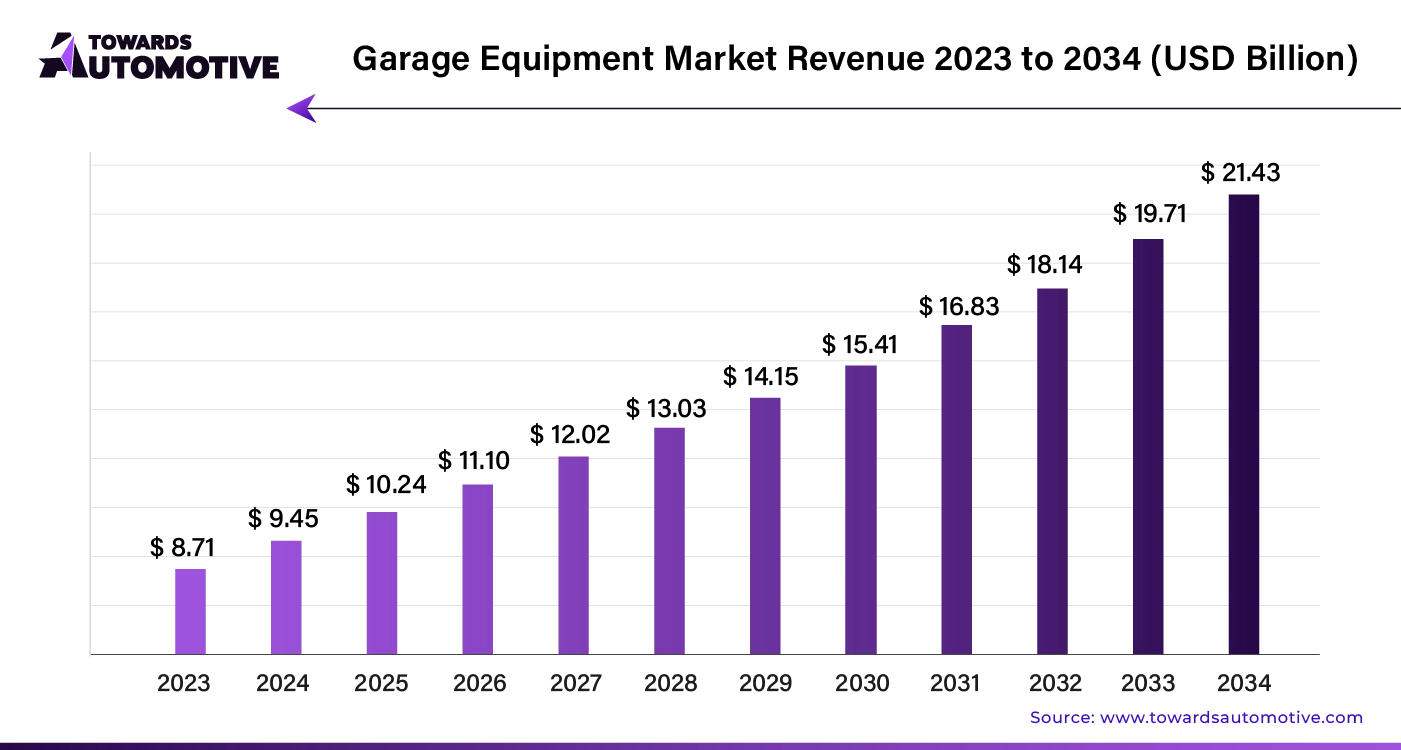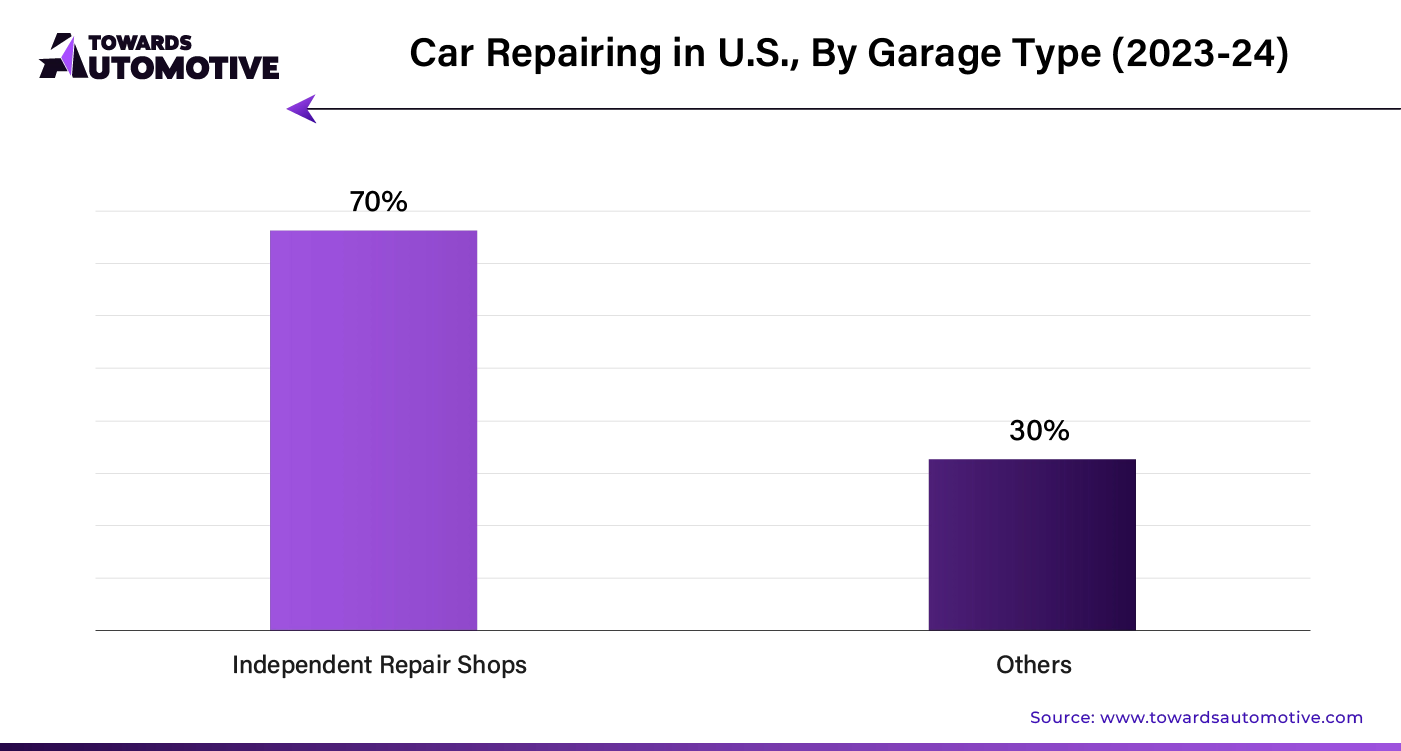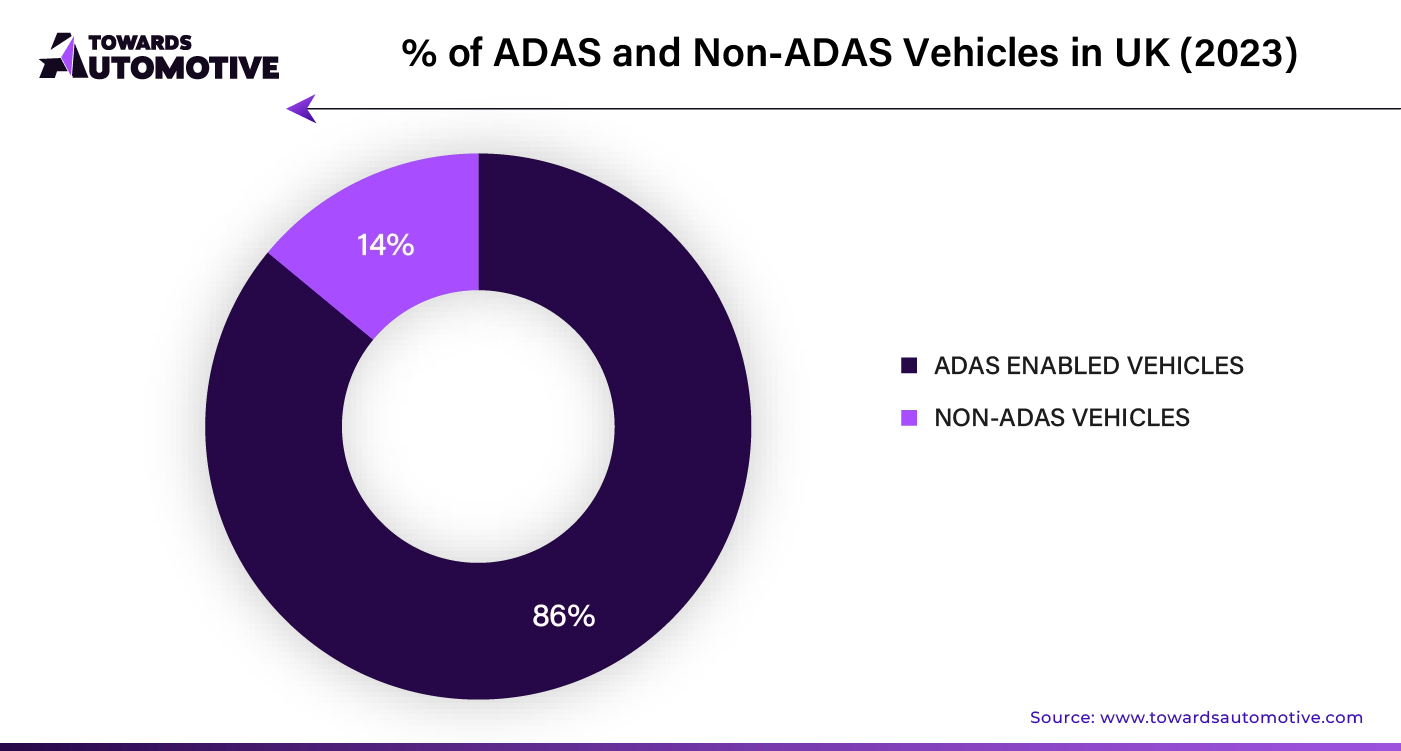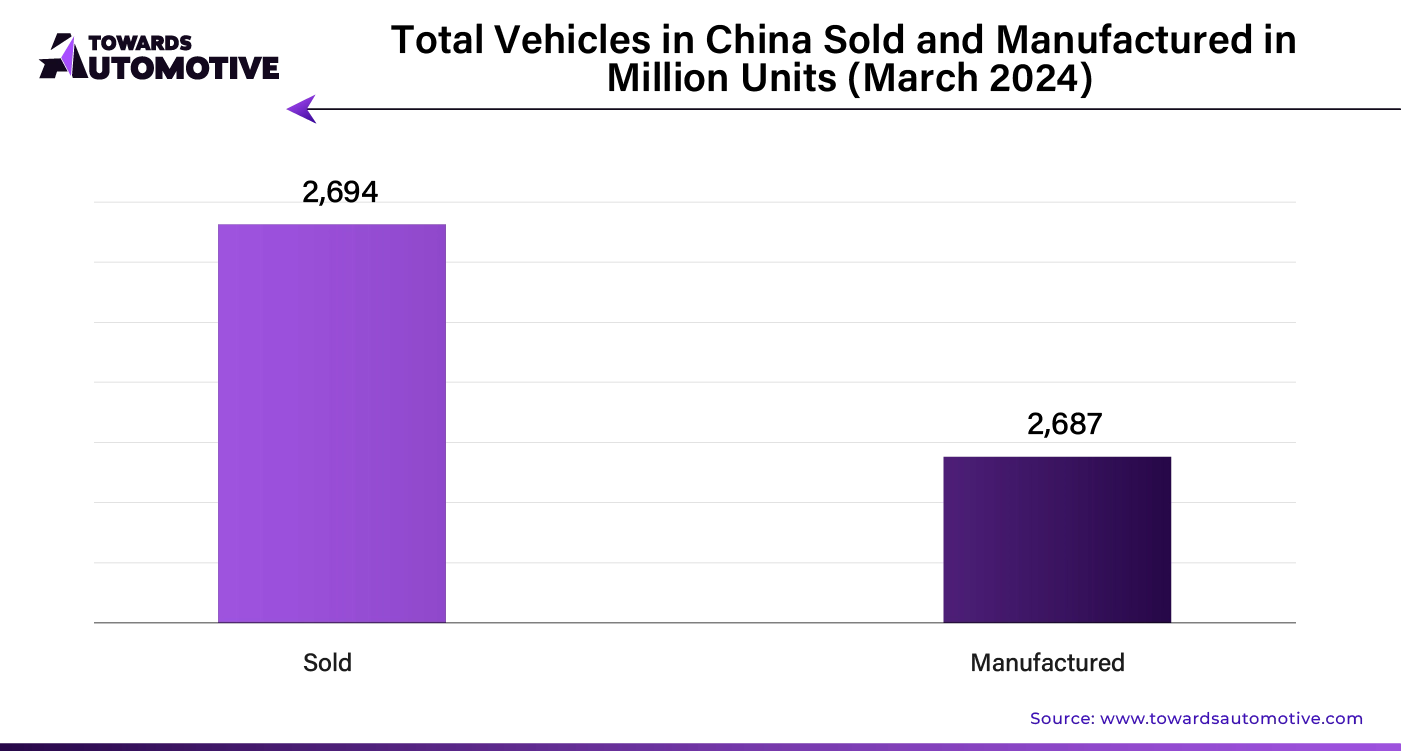March 2025
The global garage equipment market size is calculated at USD 9.45 billion in 2024 and is expected to be worth USD 21.43 billion by 2034, expanding at a CAGR of 8.45% from 2023 to 2034.

Unlock Infinite Advantages: Subscribe to Annual Membership
The increasing ownership of vehicles is boosting demand for garage equipment, especially for maintenance and repair services. Technological advancements are propelling this growth, as manufacturers innovate to create advanced equipment with enhanced features like automation and connectivity. These innovations improve garage operations, attracting customers seeking modern, efficient solutions.
The integration of digital technologies such as IoT and AI into garage equipment allows for remote monitoring, predictive maintenance, and data-driven decision-making, further enhancing operational efficiency. Growing consumer awareness of vehicle maintenance and safety also drives market growth, as people recognize the importance of regular upkeep to ensure their vehicles' longevity and performance. Additionally, stricter safety and emissions regulations highlight the need for high-quality garage equipment to meet compliance standards.
The expanding automotive aftermarket industry presents significant opportunities for garage equipment manufacturers and service providers. The rise of electric and hybrid vehicles also opens new avenues for developing specialized tools and equipment tailored to these vehicles' unique requirements. The automotive market valued at USD 4,070.19 billion in 2023, is experiencing growth and is projected to surpass USD 6,678.28 billion by 2032, with a significant CAGR of over 5.66%.
The demand for garage equipment is growing as more people own vehicles and seek professional maintenance and repair services. Consumers increasingly prefer garages equipped with modern tools like vehicle lifts, diagnostic devices, and tire changers, boosting sales in the market.
Technological advancements are also playing a key role, with automotive service centers adopting automation, connectivity, and digital solutions to improve efficiency and customer satisfaction. The rising awareness of the importance of regular vehicle maintenance and safety is further driving the popularity of advanced equipment.
Moreover, regulatory mandates and industry standards related to vehicle safety, emissions, and maintenance are pushing the adoption of specialized garage equipment. This equipment's versatility across various automotive sectors—passenger vehicles, commercial fleets, and specialty vehicles—ensures its widespread use across industries.
Economic instability reduces consumer spending on vehicle maintenance, leading to lower demand for garage equipment and slowing sales for manufacturers. High costs of advanced equipment deter small automotive service providers and independent garages from adopting new tools, limiting market growth. A shortage of skilled technicians capable of operating complex equipment further hampers effective use and market expansion. Additionally, stringent regulations increase operational costs and the risk of non-compliance, which can result in fines and damage to business reputations. Moreover, competition from DIY repair shops and online platforms offering aftermarket parts undermines traditional garage equipment businesses, affecting both sales and service revenues.
The integration of AI in the garage equipment market is poised to revolutionize the industry by streamlining operations, enhancing efficiency, and boosting overall growth. AI-powered diagnostic tools can quickly identify vehicle issues, reducing downtime and improving customer satisfaction. Predictive maintenance, driven by AI, allows for timely repairs, minimizing equipment failures and extending the lifespan of tools. Additionally, AI enhances inventory management, ensuring that garages are stocked with the right parts at the right time, reducing costs and optimizing space.
Furthermore, AI-driven automation can handle routine tasks, freeing up technicians to focus on more complex work, thereby increasing productivity. The ability of AI to analyze large datasets and provide actionable insights will enable garages to make data-driven decisions, improving service quality and customer retention. As the demand for advanced automotive services grows, the adoption of AI in garage equipment will be a key driver of market expansion, positioning businesses to meet the evolving needs of the automotive industry efficiently and effectively.
In the Garage Equipment market, the supply chain plays a critical role in ensuring timely delivery of products and services. Manufacturers begin by sourcing raw materials from reliable suppliers, focusing on quality and cost-effectiveness. These materials are then transformed into finished goods through streamlined production processes. Once manufactured, products are stored in strategically located warehouses to facilitate quick distribution.
Distributors, working closely with manufacturers, ensure that these products reach dealers and retailers across various regions. Advanced logistics and transportation networks are employed to minimize delivery times and reduce costs. Retailers then stock the equipment, making it readily available to end-users, including automotive service centers and individual consumers.
Throughout the supply chain, communication and collaboration between stakeholders are key to maintaining inventory levels and meeting market demand. Real-time tracking systems and data analytics are utilized to monitor the flow of goods, enabling swift responses to any disruptions or changes in demand. By optimizing each step of the supply chain, the Garage Equipment market ensures efficiency, cost control, and customer satisfaction.
The garage equipment market thrives on a diverse range of components and innovations. Major components include vehicle lifts, wheel alignment systems, diagnostic tools, and tire changers. Companies like Snap-on and Bosch dominate with high-quality diagnostic tools that offer advanced analytics and precision. Mohawk Lifts is renowned for its robust vehicle lifts that cater to both small garages and large service centers. Hunter Engineering leads in wheel alignment systems, enhancing vehicle safety and performance with state-of-the-art technology.
In the tire-changing segment, companies like Coats and Tecalemit provide essential machinery that simplifies and accelerates the tire replacement process. These firms focus on durability and efficiency, essential for high-volume operations. Additionally, Rotary Lift stands out for its innovative solutions in lift systems, offering advanced safety features and enhanced lifting capabilities.
Each company contributes uniquely to the ecosystem: Snap-on's diagnostic tools ensure accurate vehicle assessments, Bosch’s comprehensive solutions enhance overall service quality, and Hunter Engineering's alignment systems improve vehicle handling. Together, these contributions help garages operate efficiently, meet industry standards, and deliver high-quality service.
The market for OEM-authorized garages is expected to grow at a solid 8.5% CAGR through 2035. This increase is driven by customer confidence in the specialized knowledge and genuine parts provided by these garages, ensuring superior maintenance and repair standards. Manufacturer endorsements further enhance their credibility, drawing in a loyal customer base that prioritizes reliable service. Additionally, extensive training, access to cutting-edge tools, and the latest technical resources help these garages stay ahead of industry trends.
The body shop equipment segment dominates the garage equipment market, with a projected 8.2% CAGR through 2035. This growth is propelled by the rising need for professional collision repair services, driven by higher vehicle ownership and accident rates. Modern vehicles, with their advanced safety features, require specialized equipment and expertise for effective repairs. Body shop equipment enables technicians to address structural damage, ensure precise painting, and restore vehicle aesthetics, thereby enhancing both safety and functionality.
The garage equipment market is poised for significant growth across key countries, including the United States, the United Kingdom, China, Japan, and South Korea, by 2034. Here's a revised analysis highlighting the expected market growth:
United States (CAGR: 8.6%)
The U.S. remains the dominant force in the North American garage equipment market, driven by its robust automotive aftermarket industry. With a vast number of vehicles on the road and a widespread network of independent garages and service centers, consumer spending on vehicle services is substantial. The market's growth is further fueled by the presence of numerous garage equipment manufacturers and technology innovators.

United Kingdom (CAGR: 9.5%)
The U.K. leads the European market for garage equipment, with a strong emphasis on vehicle safety, emissions, and roadworthiness. Government initiatives promoting environmental sustainability push automotive service providers to adopt modern diagnostic tools and emissions testing equipment. Additionally, mandatory certification and training programs for technicians further accelerate market growth.

China (CAGR: 8.7%)
China's increasing vehicle ownership drives a growing demand for automotive repair and maintenance services, establishing it as a key player in the global garage equipment market. The expanding automotive aftermarket sector provides significant opportunities for equipment manufacturers and service providers. The adoption of digital technologies in garage operations enhances efficiency and contributes to market growth.

Japan (CAGR: 10.3%)
Japan, known for its commitment to quality and precision in automotive manufacturing, leads the Asian market in garage equipment demand. Japanese automotive service providers prioritize advanced equipment solutions to meet the needs of modern vehicles, particularly hybrids and electric models. The country’s focus on technological innovation and product development underpins strong market growth.
South Korea (CAGR: 9.6%)
South Korea’s automotive industry, bolstered by government support for technological innovation and environmental sustainability, drives demand for advanced garage equipment. South Korean manufacturers are recognized for producing high-quality equipment tailored to modern vehicles, solidifying the country’s growing influence in the global market.
Leading companies in the garage equipment industry are making significant strides in research and development to deliver innovative solutions that meet the evolving demands of automotive service providers and vehicle owners. By embracing digitalization, automation, and connectivity, these players are enhancing the precision, reliability, and efficiency of garage equipment, ultimately boosting productivity and customer satisfaction.
To broaden their global footprint, major players are forming strategic partnerships, collaborations, and acquisitions, allowing them to penetrate new markets and reinforce their presence in key regions. Additionally, they are actively promoting their cutting-edge solutions to raise awareness among automotive service providers and end users.
By Garage Type
By Application
By Installation Type
By Function Type
By Vehicle Type
By Region
March 2025
March 2025
March 2025
February 2025
We offer automotive expertise for market projections and customizable research, adaptable to diverse strategic approaches.
Contact Us